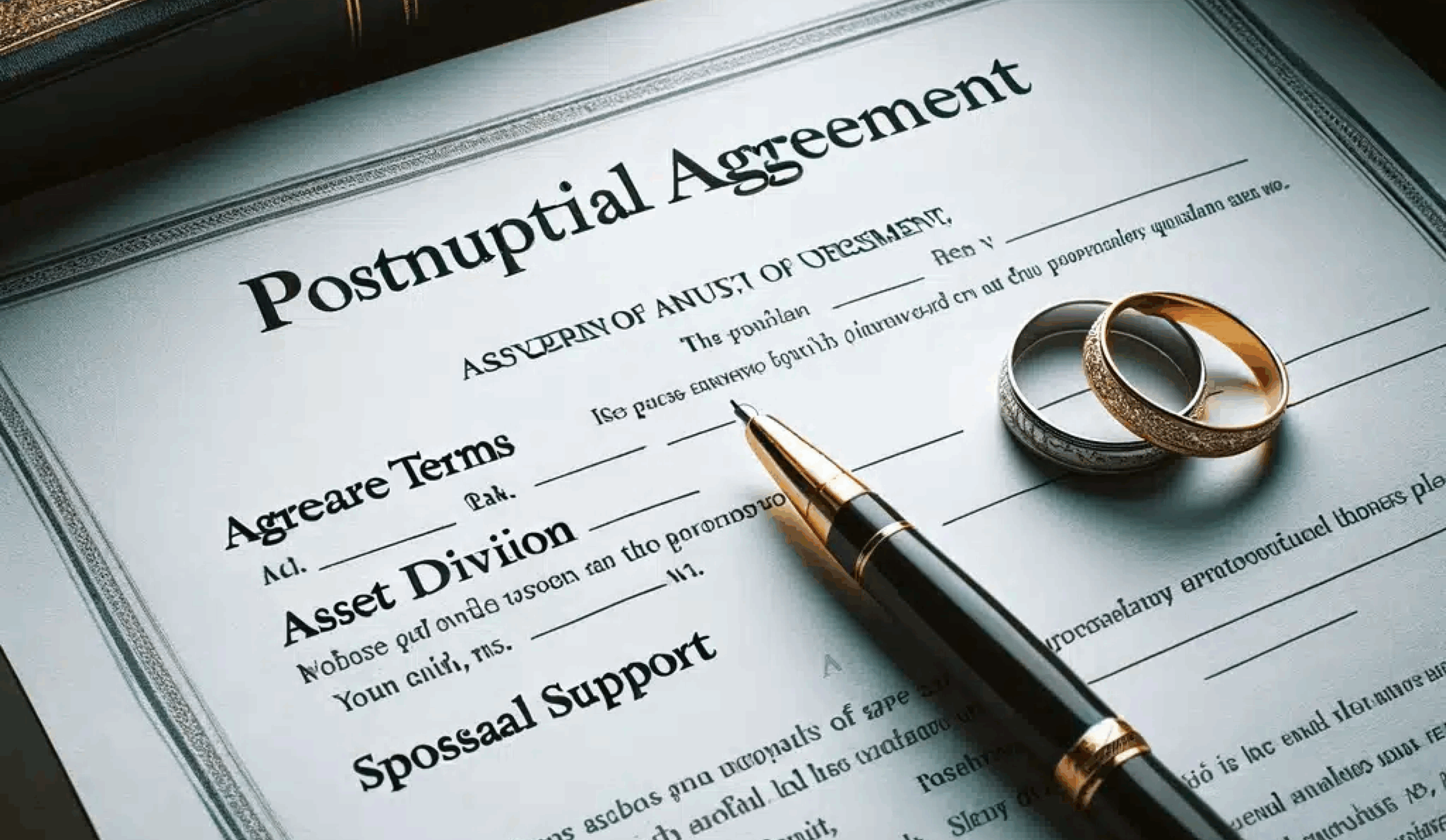Key Takeaways
- A postnuptial agreement is a legally binding contract spouses sign after getting married.
- Postnups can address property division, debt, spousal support, and inheritance rights.
- Massachusetts courts uphold postnups only if they meet strict fairness and disclosure standards, making it important to get it right from the beginning.
- Full financial disclosure and separate legal counsel for each spouse are strongly recommended.
- Postnups can be useful in second marriages, after business changes, or following marital conflict.
- Courts may reject a postnup if it’s unfair at the time of signing or enforcement.
A postnuptial agreement in Massachusetts is a legally binding contract between spouses made after marriage to define the division of assets, debts, and potential spousal support in the event of separation, divorce, or death.
Recognized by the Massachusetts Supreme Judicial Court in Ansin v. Craven-Ansin (2010), these agreements are distinct from prenuptial agreements due to their post-marriage timing and stricter judicial scrutiny.
Postnups address post-marriage developments like inheritance, business ventures, or reconciliation after marital issues. However, if the agreement seems to anticipate or encourage divorce, it may not be valid. For legal protection and enforceability, it’s important to have any postnup drafted by an experienced attorney.
For broader marital agreement guidance, see Worcester family law options.

What Are the Massachusetts-Specific Rules for Enforceability of Postnuptial Agreements?
A Massachusetts courts apply five criteria from Ansin v. Craven-Ansin to enforce a postnuptial agreement: (1) opportunity for independent legal counsel, (2) absence of fraud or coercion, (3) full and fair financial disclosure, (4) knowing and voluntary waiver of marital rights, and (5) fair and reasonable terms at both signing and enforcement.
Note that courts apply stricter scrutiny here than they do for prenups. About 70 to 80% of postnups are upheld if these conditions are satisfied. Postnups lacking full disclosure or showing signs of pressure are often rejected. Using separate attorneys strengthens the enforceability, too, because it shows that both spouses had access to independent counsel.
How Does the Court Assess Fairness in Postnuptial Agreements?
The court assesses fairness in postnuptial agreements twice: once at signing for balance and again at enforcement to account for changed circumstances.
Note that significant life changes (like a 20 to 30% income drop or major illness) can affect how enforceable a postnup is.
Judges consider bargaining power, access to legal advice, and the overall reasonableness of the terms. Legal review before signing can ensure compliance.

What Role Does Financial Disclosure Play in Enforceability?
Complete financial disclosure plays an important role in enforceability because missing or misstated asset and debt information voids agreements in 10 to 20% of challenges.
Attaching detailed financial schedules and asset valuations is recommended. Learn more about financial disclosures in Massachusetts to get a clearer picture.
How Can You Modify a Postnuptial Agreement in Massachusetts?
Postnuptial agreements in Massachusetts can be modified by mutual consent through a new written contract meeting the same validity standards as the original, but court approval is required if the modification is linked to divorce proceedings.
Triggers for modification include the birth of children or acquisition of new assets. Typical processes take 1 to 4 weeks and cost $500 to $3,000. One-sided changes are unenforceable.
Learn more about modifications in Massachusetts family law to help you make informed decisions here.
What Circumstances Allow Revocation of a Postnuptial Agreement?
Postnuptial agreements can be revoked by mutual agreement through a written document or physical destruction, and courts may revoke an agreement due to fraud, coercion, or unconscionability.
Emerging evidence of duress within 1 to 5 years of signing may support revocation. Without revocation, the agreement’s terms remain binding.
If you’re seeking revocation, work with an experienced attorney.
What Tax Implications Arise from Postnuptial Agreements in Massachusetts?
Postnuptial agreements generally don’t trigger immediate tax consequences but can affect alimony deductibility and gift taxes.
Since 2019, alimony is no longer tax-deductible for the payer under federal law. Transfers exceeding $18,000 per year may be subject to gift tax. The right structuring can yield 10 to 25% savings.
Note that there are variances between federal and state filings.
Learn more about taxes in Massachusetts family law to explore your options.
How Do Asset Transfers in Postnups Affect Taxes?
Transfers between spouses in postnups are often tax-free under the marital deduction, but large transfers (especially if they’re enforced through divorce) can trigger capital gains tax.
“Large” is the watchword here. Transfers that exceed $100,000 are more likely to be scrutinized. Professional tax and legal advice from an experienced attorney can help you limit your liabilities.

How Does a Postnuptial Agreement Impact Divorce Proceedings in Massachusetts?
Postnuptial agreements streamline divorce proceedings by guiding asset division, debt allocation, and alimony, but courts still assess terms for fairness at the time of divorce.
Life changes like job losses or illnesses that reduce support ability by 15 to 25% may justify revising terms. Outdated agreements can be disregarded. Learn more about the Massachusetts divorce process to understand the impact of a postnup.
What Happens If a Postnup Is Challenged During Divorce?
If a postnup is challenged during divorce, the spouse seeking enforcement has to prove the agreement’s validity.
To do that, courts examine evidence of duress, coercion, or incomplete disclosure. About 20 to 40% of challenges succeed, often on technical grounds. Experienced representation is important here. You should also learn more about alimony changes in Massachusetts for related issues.
What Challenges Arise in Enforcing Postnuptial Agreements?
Common challenges in enforcing postnuptial agreements include claims of coercion or inadequate disclosure.
Courts will scrutinize the situation closely, especially in high-asset or emotionally charged marriages. Contestation happens in 5 to 15% of cases and often leads to invalidation when DIY agreements are used. Learn more about avoiding divorce mistakes in Massachusetts for risk reduction.

Frequently Asked Questions
Can a postnuptial agreement be enforced if signed under emotional stress in Massachusetts?
Emotional stress alone may not void a postnup, but if it rises to coercion, the agreement may be invalidated.
How often do Massachusetts courts invalidate postnuptial agreements?
Roughly 20 to 40% are invalidated due to procedural or fairness issues.
What if new assets are acquired after signing a postnup?
New assets are not automatically covered; an amendment is needed for inclusion.
Does a postnuptial agreement affect estate planning in Massachusetts?
Yes, it can override default inheritance rules and guide asset distribution.
Can postnups include provisions for business interests in Massachusetts?
Yes, business assets and valuations can be addressed, including ownership rights and division terms.

Michelle Murray has devoted her practice exclusively to family law matters, focusing her efforts on assisting clients through divorce, custody, property division, child support, spousal support, and visitation issues throughout Worcester County.
